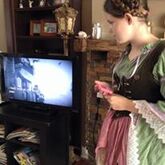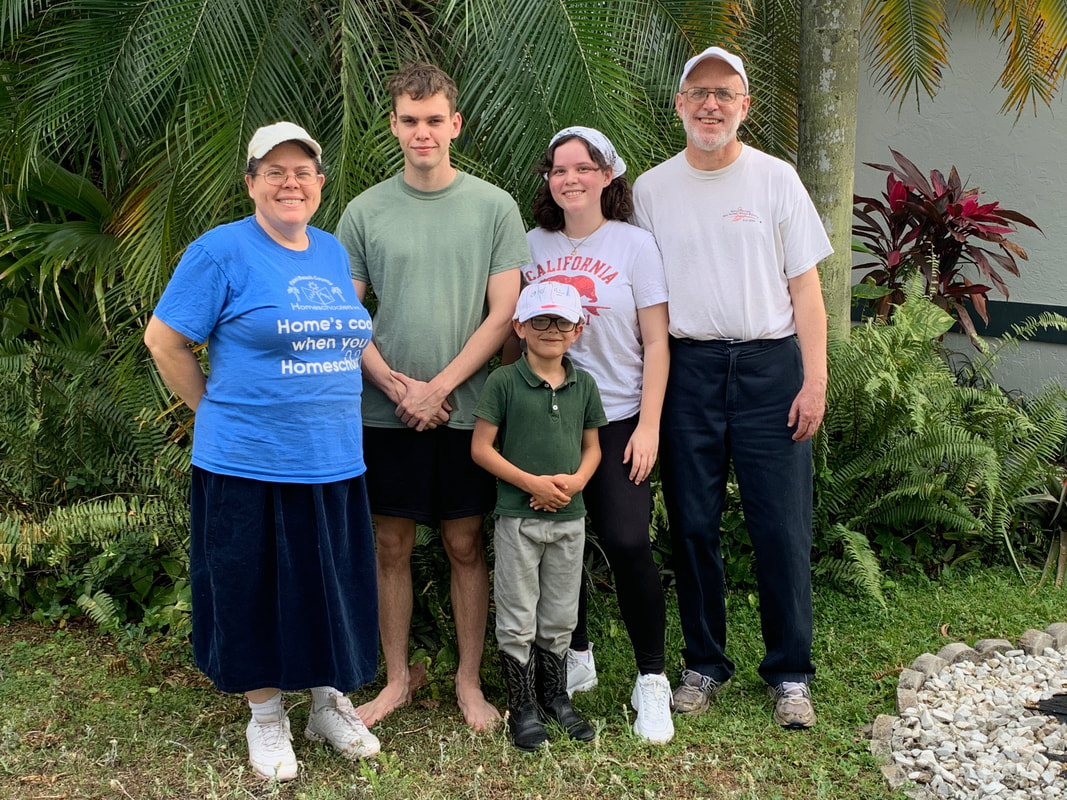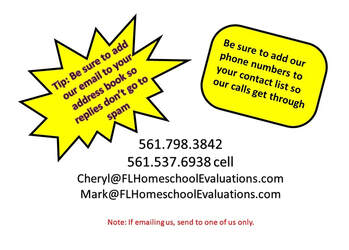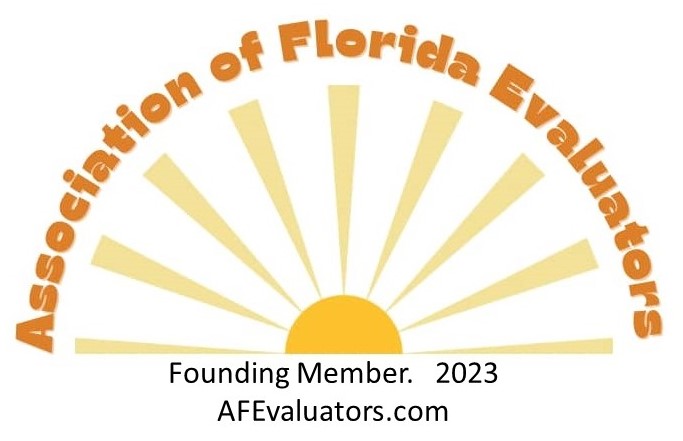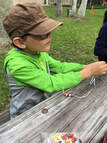|
Talking About
Florida Homeschooling... Evaluations and More |
A good evaluator works for the parents, assisting them in meeting legal requirements and in supporting them when districts overstep their bounds." |
|
The newly expanded FTC scholarship Student Learning Plans Via the school choice bill that passed a few weeks ago, the Florida Tax Credit Scholarship will give government funding to parents that can be used for a new homeschooling option called the Personalized Education Program (or PEP). The scholarship will be open for 20,000 more students this coming school year and 40,000 more the next year, and more the next year. The scholarship will offer serious money that will vary depending on the school district and grade level of the student --per figures on previous funding for this scholarship (it wasn't previously open for homeschooling but it isn't a new scholarship), the money will be more than $6000 but could get around $8000. The law regarding this takes effect July 1st, 2023. Per talking to the CEO of AAA aaascholarships.org (one of the two scholarship funding organizations; the other is Step Up for Students https://www.stepupforstudents.org/scholarships/personalized-education-program/), signups have started even though they can't approve anyone until after July 1. Why? Because the scholarship is supposed to give 1st priority to those with an income under 185% of the Federal Poverty Guidelines and a 2nd priority to those with an income under 400% of the FPG. The organizations want families to get applications in place so they can get in line to see who will be approved based on their income even though all the application pieces aren't fully in place yet. So parents can start the application process now but won't be able to finalize all the parts of it yet. 1. The application process will require proving family income to be given first or second priority. 2. The process will include swearing to spend the funds on the student's education and agreeing to have your child be in a PEP if you want to use the funds for homeschooling. This means that if your child is approved for this funding, you'll have to end your child's current education (withdraw from a school OR send a Letter of Termination with an evaluation to end home education if currently homeschooling). 3. You'll have to file a Student Learning Plan and agree to end the public school's school year with either public school testing or testing from an approved list on the Florida Dept of Education's site. The two scholarship funding organizations will have, based on what I've been told by their leadership, different approaches to setting up a Student Learning Plan. Here's what I know so far about the two options and their Student Learning Plan (and you'd have to pick one or the other organization to apply to): ---- AAA will use a form based on one that I and my evaluators' support group designed. We tried, as much as we could, to make it keep the freedom that home education programs have. Their Student Learning Plan form will first ask the parent to indicate that they understand that taking on this money means that the parent agrees to update their Student Learning Plan as needed, agrees to pay for FLVS Flex, public school, dual enrollment, and other public school programs that are free to home education students, and will submit test scores at the end of the year. (These are all requirements of the law). (Note that parents accepting the scholarship are accepting funding from the state. FLVS classes, dual enrollment, and public school classes/programs are usually paid for by the state for student, but if a student is already funded by the state through a scholarship, the state is not going to fund that student twice.) It asks questions about record-keeping such as the format you'll use for keeping a Log of Educational Activities. So you could choose from options like keeping a calendar or planner with notes, or a computer program's reports, or lesson plans from a publisher, or keeping a social media account, or.... It will list a variety of options and end with a final option of "other" to allow for any other possibility that wasn't included in the choices. It will ask whether titles of reading materials will be kept in the Log of Educational Activities or in a separate list (or there's an "other" option). It will ask about the sorts of samples of materials used by or created by the student that the parent plans to keep--they could be worksheets, or photos of projects, or screenshots of programs or apps used, or... (and there's an "other" option). It will ask about your specific plan and give a variety of options for doing that. You could just name a curriculum, or name a homeschooling method (classical homeschooling, school-at-home, unschooling, or use a list of educational goals, or indicate that the student with take FLVS or dual enrollment or other classes, or state that you'll be using tutors, ... or indicate that you'll use a co-op or other program with a homeschool support group, (and there's an "other" option)). It will ask if you plan to have your student test at a public school or will arrange private testing using one of the tests approved by the FL Dept of Education since testing is required. It will ask the parent to give details (such as naming the curriculum choice or co-op or classes or such) and identify any goods or services needed to address the academic needs of the student. This is legally required as it is where parents will specify what they want to spend the money on. ---- For both organizations, the Student Learning Plan is to be editable by the parent at any time. So if a curriculum or such isn't working for the child or if the parent wants to use the money for something else or wants to change the testing choice or so on, the plan can be changed. This is how the parent sets what the money can be spent on. ---- Step Up for Students (SUFS) has a different approach to setting up the Student Learning Plan. SUFS will have (at least for this first year) a two-phase process of setting up a Student Learning Plan. First, the parent will choose up to 4 educational priorities (and are given a list that will include all subject areas and other choices) or will choose up to 4 social emotional learning priorities (including items such as responsibility or integrity). In phase two, parents will be shown sets of suggested links based on the goals and grade level of the student (and perhaps other informion?) that suggest items that Step Up for Students believes might help the student with the learning goals chosen. The parent can buy things with scholarship funds using those links, though there should be a route for choosing other curricula or other materials or resources to pay for with scholarship funding. --- Cheryl Trzasko FLHomeschoolEvaluations.com
0 Comments
Your comment will be posted after it is approved.
Leave a Reply. |
Archives
April 2024
Categories
All
|

 RSS Feed
RSS Feed
